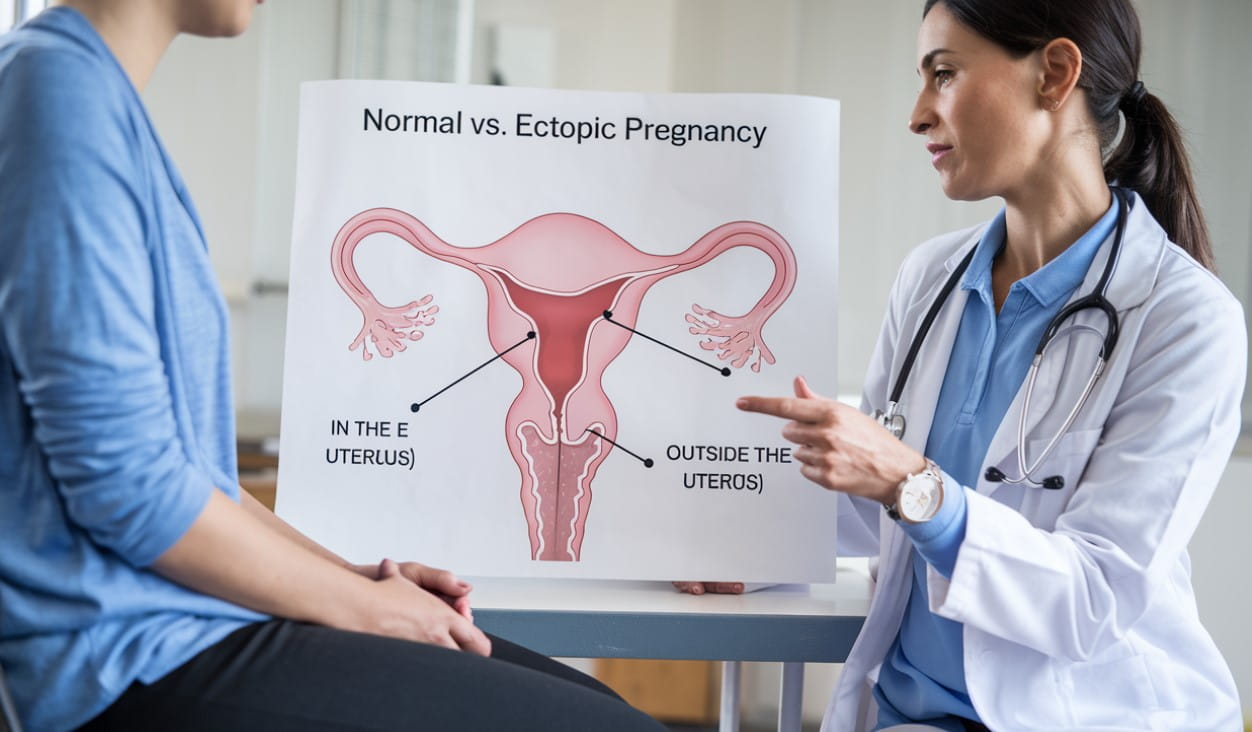
The excitement of a positive pregnancy test is often accompanied by a flurry of questions about what lies ahead. One common concern that may arise, especially for those with risk factors or unusual early pregnancy symptoms, is: "Can a pregnancy test detect an ectopic pregnancy?" While a home pregnancy test can confirm the presence of the pregnancy hormone hCG, the answer to whether it can specifically identify an ectopic pregnancy is more nuanced. This blog post will explore what a pregnancy test tells you about an ectopic pregnancy, delve into the limitations of early pregnancy tests in diagnosing ectopic pregnancies, and highlight the importance of recognizing early ectopic pregnancy symptoms a pregnancy test won't reveal. Furthermore, we're excited to share that Hillspring Bio is currently developing APEK, a novel kit aimed at aiding in the early detection of ectopic pregnancies, offering a potential advancement in women's health.
What a Standard Pregnancy Test Detects
Most over-the-counter and clinical pregnancy tests work by detecting the presence of human chorionic gonadotropin (hCG) in urine or blood. hCG is a hormone produced by the placenta after a fertilized egg implants. A positive result on a standard pregnancy test simply indicates that hCG is present in your system, confirming that a pregnancy has occurred.
The Limitation: Location, Location, Location
The crucial point to understand is that standard pregnancy tests are designed to detect the presence of hCG, not the location of the pregnancy. Whether the fertilized egg has implanted correctly within the uterus (a normal intrauterine pregnancy) or outside the uterus (an ectopic pregnancy), the body will still produce hCG. Therefore:
A positive pregnancy test cannot definitively confirm or rule out an ectopic pregnancy.
You can have a positive pregnancy test result with an ectopic pregnancy. This is why it's essential to be aware of other potential symptoms that may indicate a problem.
Early Ectopic Pregnancy Symptoms a Pregnancy Test Won't Reveal
While a pregnancy test can give you the initial confirmation of pregnancy, it won't provide any information about its location. This is where being vigilant about your body and understanding the early ectopic pregnancy symptoms a pregnancy test won't reveal becomes critical. These symptoms often develop a few weeks after a missed period and can include:
1.Unilateral (one-sided) pelvic or abdominal pain: This can range from mild and aching to severe and sharp.
2.Abnormal vaginal bleeding: This may be lighter or heavier than your usual period, or have a different color or consistency.
3.Shoulder tip pain: Pain felt in the tip of your shoulder, often on one side.
4.Dizziness or fainting: These can occur due to internal bleeding.
If you experience a positive pregnancy test along with any of these symptoms, it is crucial to seek immediate medical attention to rule out an ectopic pregnancy.
The Importance of Early Medical Evaluation
A healthcare professional can use several methods to determine the location and viability of a pregnancy, especially if an ectopic pregnancy is suspected. These include:
1.Blood tests (serial hCG levels): Monitoring the trend of hCG levels can provide clues. In a normal early pregnancy, hCG levels typically double every 48-72 hours. In an ectopic pregnancy, the rise may be slower or plateau.
2.Transvaginal ultrasound: This imaging technique allows doctors to visualize the uterus and fallopian tubes to confirm the location of the gestational sac. The absence of a gestational sac in the uterus, along with the potential visualization of a mass outside the uterus, can indicate an ectopic pregnancy.
Introducing APEK: Hillspring Bio's Innovative Approach to Early Detection
At Hillspring Bio, we understand the anxiety and potential risks associated with ectopic pregnancies. That's why we are dedicated to developing innovative solutions for early detection. We are proud to announce that Hillspring Bio is currently developing APEK, a novel kit designed to aid in the early detection of ectopic pregnancies.
While still in development, APEK aims to go beyond simply detecting the presence of hCG. Our goal is to create a user-friendly kit that can potentially provide earlier indicators or risk assessments for ectopic pregnancy, allowing for more timely medical intervention and potentially improving outcomes for women.
We believe that empowering women with more information and tools for early detection is crucial. Stay tuned for updates on the development and availability of APEK from Hillspring Bio.
Conclusion: A Positive Test is Just the First Step
While a positive pregnancy test is an exciting first step, it provides limited information about the pregnancy's location. It cannot detect an ectopic pregnancy. Being aware of the early symptoms of an ectopic pregnancy and seeking prompt medical evaluation if you experience them is crucial for your health.
Hillspring Bio is committed to advancing women's health through innovation. We are hopeful that our developing APEK kit will offer a future solution for earlier ectopic pregnancy detection. In the meantime, if you have a positive pregnancy test and experience any concerning symptoms, please don't hesitate to contact your healthcare provider immediately.



